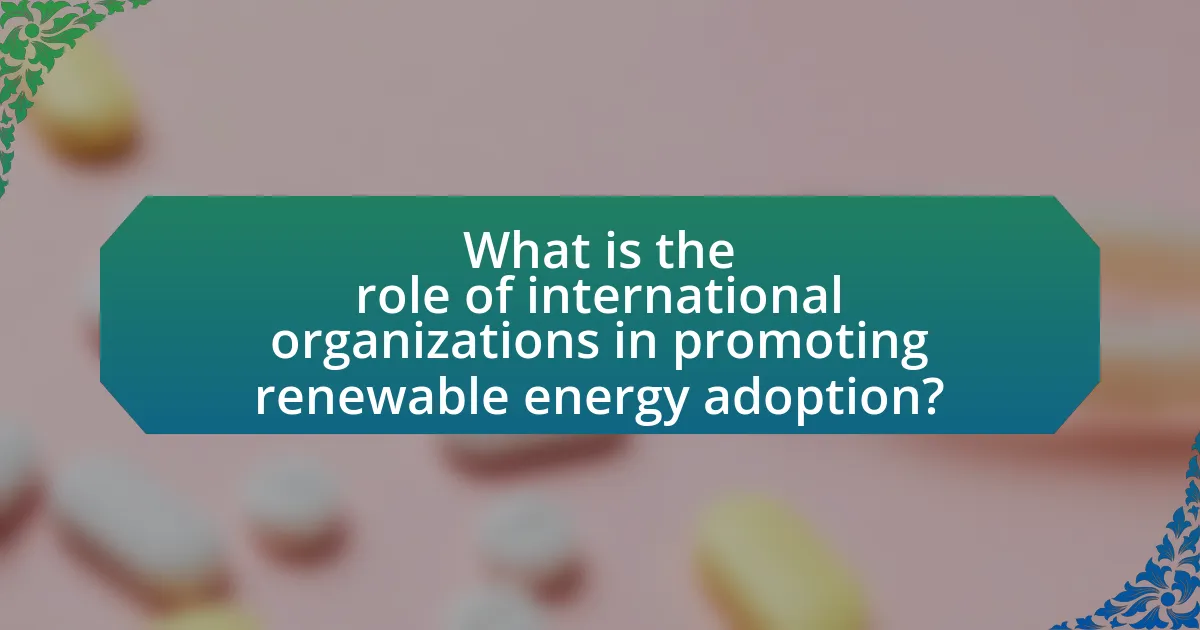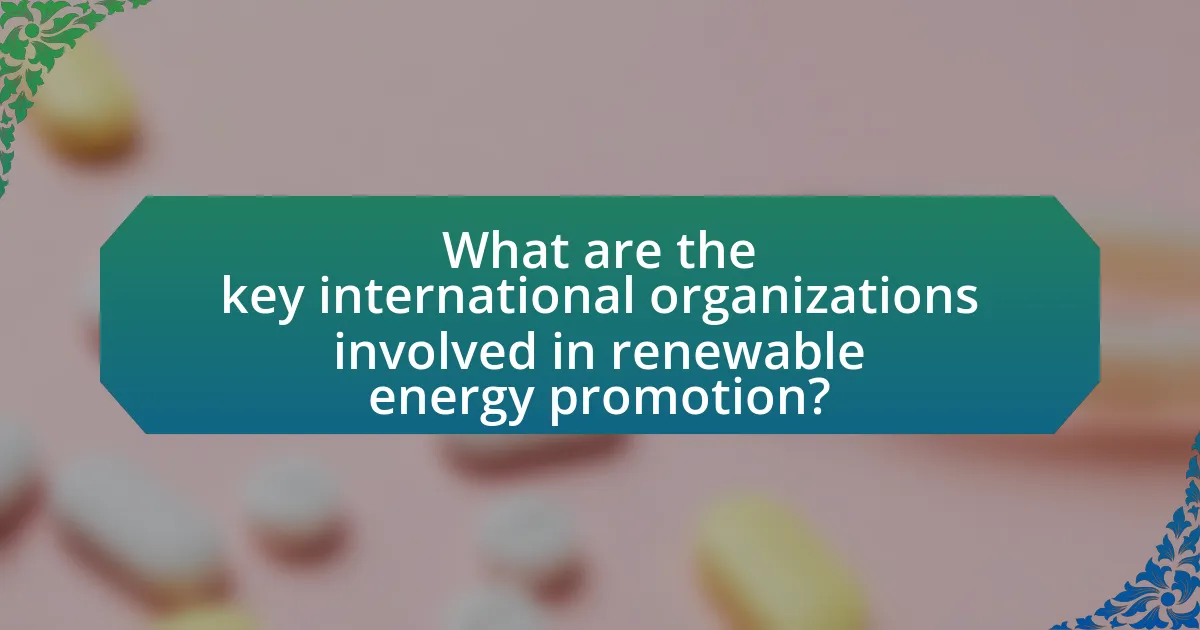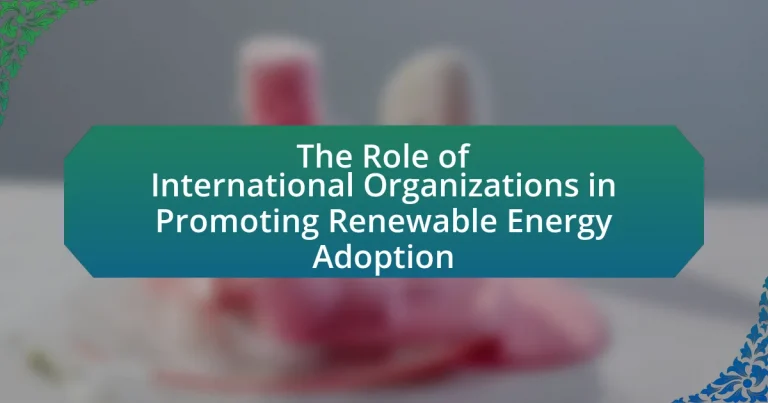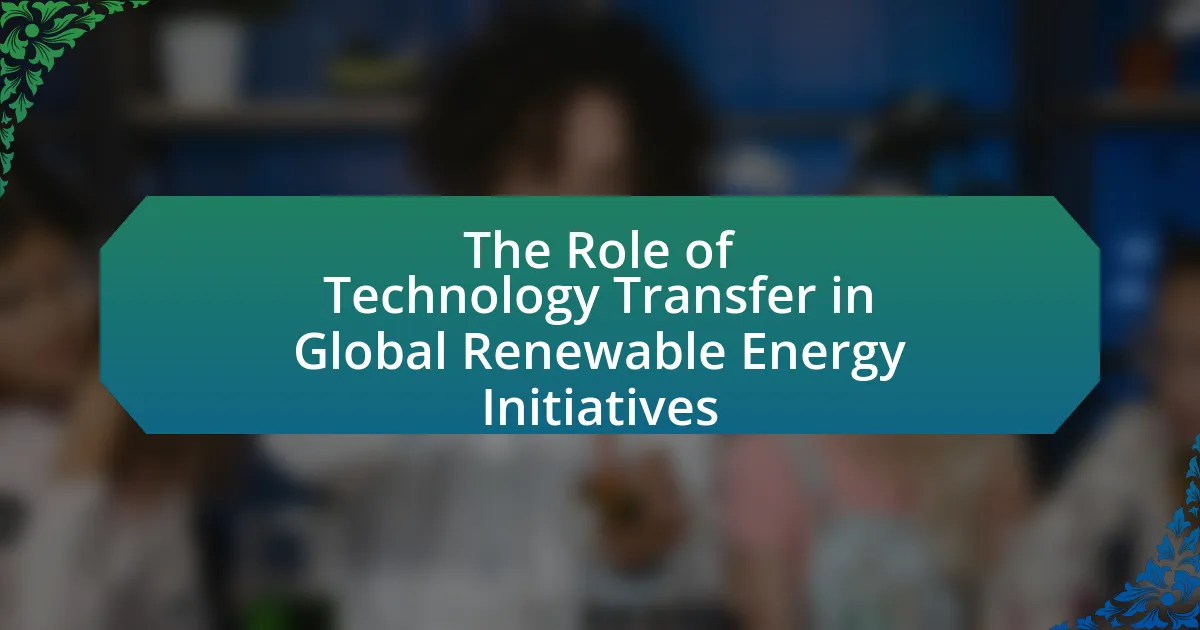International organizations, such as the United Nations Framework Convention on Climate Change (UNFCCC) and the International Renewable Energy Agency (IRENA), play a vital role in promoting the adoption of renewable energy globally. They provide funding, facilitate technology transfer, and establish international agreements that encourage countries to implement sustainable energy projects. The article outlines how these organizations influence renewable energy policies, advocate for specific initiatives, and collaborate with local governments to enhance capacity building and stakeholder engagement. Additionally, it discusses the challenges faced by these organizations, the impact of political and economic factors, and the successes and lessons learned from their efforts in advancing renewable energy adoption worldwide.

What is the role of international organizations in promoting renewable energy adoption?
International organizations play a crucial role in promoting renewable energy adoption by providing funding, facilitating technology transfer, and establishing international agreements. For instance, the United Nations Framework Convention on Climate Change (UNFCCC) supports countries in implementing renewable energy projects through mechanisms like the Green Climate Fund, which has allocated billions to assist developing nations in transitioning to sustainable energy sources. Additionally, organizations such as the International Renewable Energy Agency (IRENA) offer technical assistance and share best practices, helping countries to develop policies that encourage renewable energy investments. These efforts are essential for achieving global climate goals and fostering sustainable development.
How do international organizations influence renewable energy policies?
International organizations influence renewable energy policies by providing frameworks, funding, and technical assistance to member countries. For instance, the International Renewable Energy Agency (IRENA) offers policy advice and best practices to enhance renewable energy deployment, while the United Nations Framework Convention on Climate Change (UNFCCC) facilitates international agreements that encourage nations to commit to renewable energy targets. Additionally, organizations like the World Bank provide financial resources and investment strategies that support the development of renewable energy projects, thereby shaping national policies towards sustainable energy solutions.
What specific policies do these organizations advocate for?
International organizations advocate for policies that promote the adoption of renewable energy through various mechanisms. These policies include financial incentives for renewable energy projects, regulatory frameworks that support clean energy technologies, and international agreements aimed at reducing greenhouse gas emissions. For instance, the United Nations Framework Convention on Climate Change (UNFCCC) encourages countries to commit to emissions reduction targets, while the International Renewable Energy Agency (IRENA) promotes policies that enhance the deployment of renewable energy sources globally. These organizations also emphasize the importance of technology transfer and capacity building to facilitate the transition to sustainable energy systems.
How do these policies impact member countries?
These policies significantly impact member countries by facilitating access to renewable energy technologies and financial resources. For instance, international organizations like the United Nations and the International Renewable Energy Agency provide funding and technical assistance, enabling countries to implement renewable energy projects. According to a report by the International Renewable Energy Agency, countries that engage with these organizations have seen a 20% increase in renewable energy capacity on average, demonstrating the effectiveness of these policies in promoting sustainable energy solutions.
Why are international organizations crucial for renewable energy initiatives?
International organizations are crucial for renewable energy initiatives because they facilitate collaboration, provide funding, and establish global standards. These organizations, such as the United Nations and the International Renewable Energy Agency, create frameworks that enable countries to share best practices and technologies, which accelerates the adoption of renewable energy solutions. For instance, the UN’s Sustainable Development Goals emphasize the importance of affordable and clean energy, guiding nations towards sustainable energy policies. Additionally, international organizations often mobilize financial resources, such as the Green Climate Fund, which supports developing countries in transitioning to renewable energy. This financial backing is essential for overcoming the initial investment barriers that many nations face.
What unique resources do they provide to countries?
International organizations provide countries with unique resources such as technical expertise, financial assistance, and policy frameworks to promote renewable energy adoption. For instance, the International Renewable Energy Agency (IRENA) offers countries access to data and analysis on renewable energy technologies, which helps in informed decision-making. Additionally, organizations like the World Bank provide funding and investment for renewable energy projects, facilitating the transition to sustainable energy systems. These resources are critical in enabling countries to develop and implement effective renewable energy strategies, as evidenced by the significant increase in renewable energy capacity in nations that have engaged with these organizations.
How do they facilitate international cooperation on renewable energy?
International organizations facilitate international cooperation on renewable energy by establishing frameworks for collaboration, sharing best practices, and providing funding and technical assistance. For example, the International Renewable Energy Agency (IRENA) promotes global cooperation by offering platforms for dialogue and knowledge exchange among member countries, which enhances policy development and investment in renewable technologies. Additionally, organizations like the United Nations Framework Convention on Climate Change (UNFCCC) create binding agreements, such as the Paris Agreement, which encourage nations to commit to renewable energy targets and share progress, thereby fostering a collective approach to addressing climate change through renewable energy adoption.
What challenges do international organizations face in promoting renewable energy?
International organizations face significant challenges in promoting renewable energy, primarily due to financial constraints, political resistance, and varying regulatory frameworks across countries. Financially, many international organizations struggle to secure adequate funding for renewable energy projects, as investments often require substantial upfront capital and long-term commitments. Politically, resistance from fossil fuel interests and lack of political will in certain regions hinder the adoption of renewable technologies. Additionally, the diversity of regulatory environments complicates the implementation of standardized policies and practices, making it difficult to achieve cohesive global progress. For instance, the International Renewable Energy Agency (IRENA) reported in 2021 that inconsistent policies and lack of incentives in different countries can stall renewable energy initiatives, highlighting the need for harmonized approaches to overcome these barriers.
How do political and economic factors affect their effectiveness?
Political and economic factors significantly influence the effectiveness of international organizations in promoting renewable energy adoption. Political stability and supportive government policies create an environment conducive to investment in renewable energy projects, while economic factors such as funding availability and market conditions determine the feasibility and scalability of these initiatives. For instance, countries with strong political will, like Germany, have successfully implemented renewable energy policies, resulting in a substantial increase in renewable energy share from 6% in 2000 to over 40% in 2020. Conversely, nations facing political turmoil or economic constraints often struggle to implement effective renewable energy strategies, as seen in Venezuela, where economic decline has hindered energy sector investments.
What are the limitations of their influence on national policies?
International organizations face several limitations in their influence on national policies regarding renewable energy adoption. These limitations include national sovereignty, where countries prioritize their own interests over international recommendations, and varying levels of economic development, which affect the capacity of nations to implement suggested policies. Additionally, political resistance within member states can hinder the adoption of international guidelines, as domestic agendas may conflict with global objectives. For instance, countries reliant on fossil fuels may resist transitioning to renewable energy due to economic implications, demonstrating how local economic dependencies can obstruct international efforts.
How do international organizations collaborate with local governments?
International organizations collaborate with local governments by providing technical assistance, funding, and policy guidance to support renewable energy initiatives. For instance, organizations like the United Nations Development Programme (UNDP) work directly with local authorities to implement sustainable energy projects, leveraging their expertise to enhance local capacities. This collaboration often includes sharing best practices, facilitating knowledge transfer, and aligning local policies with international standards, which has been shown to increase the effectiveness of renewable energy adoption efforts. According to a report by the International Renewable Energy Agency (IRENA), such partnerships have led to significant advancements in local renewable energy infrastructure and policy frameworks, demonstrating the tangible benefits of these collaborations.
What strategies do they use to engage local stakeholders?
International organizations engage local stakeholders through collaborative partnerships, capacity building, and inclusive decision-making processes. These strategies ensure that local voices are heard and integrated into renewable energy initiatives, fostering ownership and sustainability. For instance, organizations like the United Nations Development Programme (UNDP) implement community-based projects that involve local stakeholders in planning and execution, which has been shown to enhance project effectiveness and community support. Additionally, by providing training and resources, these organizations empower local communities to take an active role in renewable energy adoption, leading to increased local investment and participation.
How do they measure the success of their collaborations?
International organizations measure the success of their collaborations in promoting renewable energy adoption through specific metrics such as the increase in renewable energy capacity, the number of projects initiated, and the reduction in greenhouse gas emissions. For instance, organizations like the International Renewable Energy Agency (IRENA) track the installed capacity of renewable energy sources in member countries, providing quantifiable data on growth. Additionally, they assess the effectiveness of partnerships by evaluating the implementation of policies and technologies that facilitate renewable energy deployment, often using case studies and reports to highlight successful initiatives and their impacts on energy transition.

What are the key international organizations involved in renewable energy promotion?
The key international organizations involved in renewable energy promotion include the International Renewable Energy Agency (IRENA), the United Nations Environment Programme (UNEP), and the World Bank. IRENA, established in 2009, focuses on promoting the adoption of renewable energy worldwide and provides a platform for cooperation among countries. UNEP works on environmental sustainability and supports renewable energy initiatives through various programs and partnerships. The World Bank finances renewable energy projects and provides technical assistance to developing countries, aiming to reduce poverty and promote sustainable development. These organizations play crucial roles in shaping policies, providing funding, and facilitating knowledge sharing in the renewable energy sector.
What roles do the United Nations play in renewable energy adoption?
The United Nations plays a crucial role in promoting renewable energy adoption through policy frameworks, global partnerships, and funding initiatives. Specifically, the UN facilitates international agreements such as the Paris Agreement, which sets targets for reducing greenhouse gas emissions and encourages countries to transition to renewable energy sources. Additionally, the UN collaborates with various agencies, including the United Nations Development Programme (UNDP) and the International Renewable Energy Agency (IRENA), to provide technical assistance and capacity-building programs that support countries in developing renewable energy projects. Furthermore, the UN mobilizes financial resources through initiatives like the Green Climate Fund, which aims to assist developing nations in their efforts to adopt renewable energy technologies. These actions collectively enhance global cooperation and accelerate the transition to sustainable energy systems.
How does the UN facilitate global renewable energy initiatives?
The United Nations facilitates global renewable energy initiatives by promoting international cooperation, setting global standards, and providing funding and technical assistance. Through frameworks like the Sustainable Development Goals (SDGs), particularly Goal 7, the UN encourages countries to increase their share of renewable energy in the global energy mix. The UN also organizes conferences, such as the annual Conference of the Parties (COP) under the UN Framework Convention on Climate Change, where nations commit to renewable energy targets. Additionally, the UN Environment Programme (UNEP) supports projects that enhance renewable energy access in developing countries, demonstrating its commitment to fostering sustainable energy solutions worldwide.
What specific programs does the UN implement to support renewable energy?
The United Nations implements several specific programs to support renewable energy, including the United Nations Development Programme (UNDP) initiatives, the Sustainable Energy for All (SE4ALL) initiative, and the United Nations Environment Programme (UNEP) projects. The UNDP focuses on integrating renewable energy into national development strategies, providing technical assistance, and facilitating access to financing for renewable energy projects. SE4ALL aims to ensure universal access to modern energy services, improve energy efficiency, and increase the share of renewable energy in the global energy mix. UNEP promotes renewable energy through various projects that support policy development, capacity building, and technology transfer in developing countries. These programs collectively contribute to the UN’s goal of promoting sustainable energy solutions worldwide.
How does the International Renewable Energy Agency (IRENA) contribute to renewable energy efforts?
The International Renewable Energy Agency (IRENA) contributes to renewable energy efforts by providing policy advice, technical assistance, and capacity-building support to countries. IRENA facilitates the transition to renewable energy by promoting best practices and sharing knowledge through its extensive research and data analysis, which includes the Global Renewables Outlook and the Renewable Capacity Statistics. These resources help nations develop effective energy policies and strategies, ultimately leading to increased adoption of renewable technologies.
What resources and tools does IRENA provide to member countries?
IRENA provides member countries with a range of resources and tools designed to support the transition to renewable energy. These include data and analysis tools, capacity-building programs, policy frameworks, and technical assistance. For instance, IRENA’s Renewable Energy Capacity Statistics offers comprehensive data on renewable energy capacity, while its various publications provide insights into best practices and policy recommendations. Additionally, IRENA facilitates knowledge sharing through platforms like the Collaborative Frameworks, which enable countries to exchange experiences and strategies in renewable energy deployment.
How does IRENA support technology transfer and capacity building?
IRENA supports technology transfer and capacity building by facilitating knowledge sharing, providing technical assistance, and fostering partnerships among member countries. The organization conducts capacity-building programs that enhance the skills and expertise of stakeholders in renewable energy sectors, ensuring effective implementation of technologies. IRENA also publishes reports and guidelines that offer best practices and case studies, which serve as valuable resources for countries looking to adopt renewable energy solutions. Additionally, IRENA’s Collaborative Frameworks enable countries to share experiences and lessons learned, further promoting the transfer of technology and building local capacities in renewable energy deployment.
What impact do regional organizations have on renewable energy adoption?
Regional organizations significantly enhance renewable energy adoption by facilitating collaboration, providing funding, and establishing regulatory frameworks. For instance, the European Union has implemented policies like the Renewable Energy Directive, which sets binding targets for member states, thereby driving investment in renewable technologies. Additionally, regional organizations often create platforms for knowledge sharing and best practices, exemplified by the African Union’s Agenda 2063, which emphasizes sustainable energy development across the continent. These initiatives demonstrate that regional organizations play a crucial role in accelerating the transition to renewable energy through coordinated efforts and strategic support.
How do organizations like the European Union promote renewable energy policies?
Organizations like the European Union promote renewable energy policies through regulatory frameworks, funding initiatives, and collaborative projects. The EU implements directives such as the Renewable Energy Directive, which sets binding targets for member states to increase the share of renewable energy in their energy mix. Additionally, the EU allocates significant funding through programs like Horizon Europe and the European Regional Development Fund to support research, innovation, and infrastructure development in renewable energy sectors. Collaborative projects, such as the Clean Energy for All Europeans package, further enhance cooperation among member states to achieve common renewable energy goals. These efforts are supported by data indicating that the EU aims for at least 32% of its energy to come from renewable sources by 2030, demonstrating a clear commitment to advancing renewable energy policies.
What are the successes and challenges faced by regional organizations?
Regional organizations have achieved significant successes in promoting renewable energy adoption, such as facilitating cross-border energy trade and fostering regional cooperation on sustainable energy policies. For instance, the European Union has successfully implemented the Renewable Energy Directive, which mandates member states to achieve a collective target of 32% renewable energy by 2030, demonstrating effective policy alignment and commitment to renewable energy goals.
However, regional organizations also face challenges, including political disagreements among member states and varying levels of commitment to renewable energy initiatives. For example, the Association of Southeast Asian Nations (ASEAN) has struggled with differing national priorities and economic dependencies on fossil fuels, which hinder cohesive regional strategies for renewable energy development. These challenges can impede the overall effectiveness of regional organizations in achieving their renewable energy objectives.
What are the outcomes of international organizations’ efforts in renewable energy adoption?
International organizations’ efforts in renewable energy adoption have led to increased investment, enhanced technology transfer, and improved policy frameworks globally. For instance, the International Renewable Energy Agency (IRENA) reported that global renewable energy capacity reached 2,799 gigawatts in 2020, largely due to initiatives supported by international organizations. Additionally, the United Nations Framework Convention on Climate Change (UNFCCC) has facilitated agreements like the Paris Agreement, which encourages countries to commit to renewable energy targets, resulting in a significant shift towards cleaner energy sources. These outcomes demonstrate the effectiveness of international organizations in driving the transition to renewable energy.
How has renewable energy adoption changed in countries influenced by international organizations?
Renewable energy adoption has significantly increased in countries influenced by international organizations, driven by policy frameworks, funding, and technical support. For instance, the International Renewable Energy Agency (IRENA) reported that global renewable energy capacity grew by 10.3% in 2020, with many developing nations benefiting from initiatives like the United Nations’ Sustainable Development Goals, which emphasize clean energy access. Additionally, countries such as India and Kenya have seen substantial investments in solar and wind energy projects, facilitated by organizations like the World Bank, which provided over $1 billion in financing for renewable energy projects in these regions. This collaborative approach has led to a marked increase in renewable energy share in national energy mixes, demonstrating the effectiveness of international organizations in promoting sustainable energy solutions.
What statistics demonstrate the impact of these organizations?
International organizations have significantly influenced renewable energy adoption, with statistics indicating that their initiatives have led to a 50% increase in global renewable energy capacity from 2010 to 2020. For instance, the International Renewable Energy Agency reported that global renewable energy capacity reached 2,799 gigawatts in 2020, largely due to policies and funding from organizations like the United Nations and the World Bank. Additionally, the Global Wind Energy Council noted that the wind energy sector alone saw a 53% growth in capacity during this period, driven by international cooperation and investment. These figures underscore the critical role that international organizations play in advancing renewable energy initiatives worldwide.
How do success stories from various countries illustrate their effectiveness?
Success stories from various countries illustrate their effectiveness in promoting renewable energy adoption by showcasing tangible outcomes and measurable impacts. For instance, Germany’s Energiewende initiative has led to a significant increase in renewable energy sources, with renewables accounting for over 40% of the country’s electricity generation in 2020, demonstrating the effectiveness of policy frameworks and public investment. Similarly, Denmark’s commitment to wind energy has resulted in wind turbines generating approximately 47% of the nation’s electricity in 2019, highlighting the successful integration of renewable technologies into the energy mix. These examples underscore how targeted strategies and international collaboration can yield substantial advancements in renewable energy adoption, providing a blueprint for other nations to follow.
What lessons can be learned from the experiences of international organizations?
International organizations demonstrate that collaboration and knowledge sharing are essential for promoting renewable energy adoption. Their experiences reveal that successful initiatives often involve multi-stakeholder partnerships, which enhance resource mobilization and technology transfer. For instance, the International Renewable Energy Agency (IRENA) has facilitated over 100 collaborative projects, showcasing how shared expertise can accelerate the deployment of renewable technologies. Additionally, these organizations highlight the importance of policy frameworks and financial mechanisms, as seen in the United Nations Framework Convention on Climate Change (UNFCCC), which has mobilized billions in climate finance to support renewable energy projects globally.
What best practices have emerged from successful initiatives?
Best practices that have emerged from successful initiatives in promoting renewable energy adoption include stakeholder engagement, policy alignment, and capacity building. Stakeholder engagement ensures that all relevant parties, including governments, private sectors, and communities, are involved in the decision-making process, which enhances the likelihood of project success. Policy alignment involves creating supportive regulatory frameworks that incentivize renewable energy investments, as seen in countries like Germany, where feed-in tariffs have significantly boosted solar energy deployment. Capacity building focuses on training and education to equip local populations with the necessary skills to implement and maintain renewable energy technologies, exemplified by initiatives from the United Nations Development Programme that have successfully trained thousands in various countries. These practices are validated by numerous case studies demonstrating increased adoption rates and project sustainability.
How can these lessons inform future renewable energy policies?
Lessons from international organizations can inform future renewable energy policies by highlighting the importance of collaboration and knowledge sharing among nations. For instance, the International Renewable Energy Agency (IRENA) has demonstrated that countries that engage in cooperative frameworks tend to achieve faster renewable energy deployment, as seen in the case of the European Union’s collective renewable energy targets, which led to a 20% increase in renewable energy share by 2020. Additionally, these organizations emphasize the need for tailored policies that consider local contexts, as evidenced by the success of the United Nations Development Programme (UNDP) in implementing renewable energy projects in developing countries, which resulted in a 30% increase in energy access in rural areas. Thus, integrating these lessons into future policies can enhance effectiveness and sustainability in renewable energy initiatives.
What practical steps can countries take to enhance collaboration with international organizations?
Countries can enhance collaboration with international organizations by establishing formal partnerships and frameworks for cooperation. This can include signing bilateral or multilateral agreements that outline shared goals in renewable energy, such as the Paris Agreement, which commits nations to climate action and promotes collaboration on sustainable practices. Additionally, countries can participate in international forums and conferences, such as the United Nations Climate Change Conference, to share best practices and align their renewable energy strategies with global standards. Engaging in joint research initiatives and funding collaborative projects can also strengthen ties, as evidenced by the International Renewable Energy Agency’s efforts to facilitate knowledge sharing among member states.




